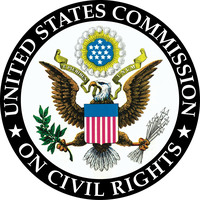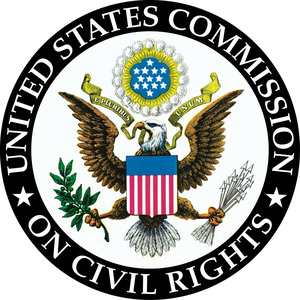WASHINGTON, Sept. 21, 2017 /PRNewswire-USNewswire/ -- Today, the U.S. Commission on Civil Rights released its report, Targeted Fines and Fees against Low-Income People of Color: Civil Rights and Constitutional Implications.
The report examines (1) the reality – and real harm – of cities imposing fines and fees on residents to raise city funds rather than to secure legal compliance and increase public safety and (2) the U.S. Department of Justice's enforcement efforts to encourage constitutional practices and hold jurisdictions accountable for constitutional violations stemming from the way these jurisdictions impose fines and fees.
The Commission's findings are drawn from diverse perspectives across the political spectrum, shared at two public briefings with policy experts, federal officials, state judges and court administrators, and advocacy groups. To prepare the report, the Commission also received information from the Department of Justice (DOJ) and reviewed relevant literature and data.
By majority vote, the Commission finds:
- Many jurisdictions now require courts to collect fees for civil and criminal activities – such as traffic violations – in addition to government programs unrelated to courts.
- In almost every state, juvenile courts impose court costs, fines, and fees on youth, their families, or both – even though research shows that imposing such fees is ineffective to actually generate revenue.
- Some cities target poor citizens and communities of color for fines and fees, using law enforcement as ticketing and collections agencies to increase municipal revenues, rather than to improve public safety and civil compliance.
- Targeting the poor and communities of color for fines and fees undermines public confidence in the judicial system.
- Best practices should break the connection between revenue from fines and fees and the budget needs of cities and courts.
- U.S. Department of Justice efforts begun in the Obama Administration to discourage these practices have increased access to justice and should continue in the Trump Administration.
These conclusions draw on bipartisan consensus, reflected in public testimony to the Commission, as well as in research and data the Commission reviewed, that cities' practices of preying financially on their own residents and targeting low income persons and persons of color are at best unwise and all too often unlawful.
Americans for Tax Reform President Grover Norquist crystalized the concerns of criminalizing poverty: "No one should have to fear being jailed for light speeding, having a tail light out, or not wearing a seatbelt. Not only is it wrong to potentially ruin someone's life over small infractions, but incarcerating an individual can often times cost the government more money as they waste resources on people who pose no threat to the community. The DOJ and the United States Commission on Civil Rights has a duty to encourage better practices in municipal courts to avoid abuse."
Former Obama Justice Department official Chiraag Bains noted the agreement on this issue across the political spectrum, pointing out the common threads in advocating for court reform: "Unlawful and unfair practices involving excessive fines, the incarceration of the poor because of their inability to pay, and racially disparate enforcement violate core American values: liberty, fairness, equality."
By majority vote, the Commission recommends:
- Courts and cities should use a common standard to evaluate an individual's ability to pay, presuming inability to pay for individuals who are homeless, incarcerated, confined to a mental health facilities, juveniles, or whose income is below the poverty level.
- DOJ should coordinate data collection and publicly share data and analysis of court fines and fees across the country. Such data collection should include the race, gender, and ability status of persons against whom fines and fees are assessed, to determine whether the assessment practices have a disparate impact on the basis of a protected status.
- States and cities should remove the potential for or existence of conflict of interest incentives to assess fines and fees by, for example, returning revenue from fines and fees to a general budget fund and discontinuing the use of for-profit collections agencies.
- DOJ should investigate additional jurisdictions related to this topic, and, where appropriate, issue reports to incentivize further, national, reform.
- Congress should enact legislation to give DOJ authority to investigate courts that impose fines and fees in an unconstitutional manner.
- Courts and cities should provide counsel to contest the imposition of a fine or fee and to determine indigency, as appropriate.
Chair Catherine E. Lhamon said, "Still, three years after the devastating spotlight on injustice the nation witnessed in Ferguson, Missouri, the Commission's investigation confirms concretely that Americans across the nation remain vulnerable today to their local governments preying on them in discriminatory ways. The recommendations in this report are vital to continuing what must be a national effort to combat unfair and unconstitutional practices in local courts and communities across the country."
The U.S. Commission on Civil Rights is an independent, bipartisan agency charged with advising the President and Congress on civil rights matters and issuing an annual federal civil rights enforcement report. For information about the Commission, please visit http://www.usccr.gov and follow us on Twitter and Facebook.
Contact: Brian Walch
Email: bwalch@usccr.gov
Tel: 202-376-8371
SOURCE U.S. Commission on Civil Rights
Related Links
WANT YOUR COMPANY'S NEWS FEATURED ON PRNEWSWIRE.COM?
Newsrooms &
Influencers
Digital Media
Outlets
Journalists
Opted In





Share this article